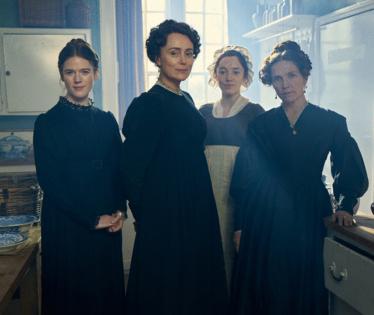'Miss Austen' review: The mystery of Jane Austen's burned letters
Published in Entertainment News
Decades after Jane Austen’s death in 1817, her older sister Cassandra burned nearly all of the author’s correspondence, much to the consternation of future fans and historians. Why were thousands of letters destroyed instead of saved for posterity and giving us a richer insight into the writer of Regency-era novels such as “Pride and Prejudice,” “Emma” and “Sense and Sensibility”? The four-part PBS Masterpiece series “Miss Austen” offers a theory: Much later in life, Cassie decided they were just too private. Too revealing.
The miniseries is agreeable enough as upscale fan fiction about the Austen sisters. That’s probably a draw for many viewers. I’m not sure it’s enough.
Based on Gill Hornby’s 2020 novel of the same name, it stars Keeley Hawes as a middle-aged Cassie who hightails it to the home of old family friends in the village of Kintbury. That’s where one of Jane’s closest confidant Eliza lived and died, and where Cassie suspects a cache of Jane’s letters are stored. She must find them! And without letting anyone know that she’s desperate to recover them, lest anyone — including Cassie’s unpleasant sister-in-law; Eliza’s daughter; an observant housemaid — ask too many questions, or get their hands on the papers in question and treat them with less discretion.
What might have been in those letters? What secrets was Cassie burying? “I imagine they would have contained a lot of indiscreet mentions of annoying relatives,” Hornby speculates in one interview, which is far less scandalous than the series implies, at least in the beginning.
Adapted by Andrea Gibb, we see the Austens in flashback, when Cassie’s upbeat personality and hopeful future comes to an end when the man to whom she was engaged dies. This is actually happened. The reason she never married anyone else? A self-flagellating contrivance invented by Hornby, but it does allow the story to speculate what Jane might have thought about her sister’s choices in life — thoughts she shared in her letters to Eliza. Reading the old letters, a bittersweet smile occasionally crosses Cassie’s face, but she’s more prone to melancholy or indignation at these memories.
Jane probably wouldn’t have cared if the letters became part of her legacy, at least the Jane we get to know here, played by Patsy Ferran, who bears a resemblance to the author (though perhaps with a leaner face). She understands the power of social pressure (it certainly was an ongoing theme in her books), but in her own life she isn’t especially worried about propriety or how things look to outsiders.
So why the (overly?) protective impulse from Cassie? By this point, the 19th century was hurtling into the fullness of the Victorian era and maybe her decision was shaped by those buttoned-up norms. Or maybe she just hated the idea of anyone poking their nose into Jane’s private side.
But as a character, she’s too underwritten for either of these possibilities to come to life, and Hawes (married to “Succession’s” Matthew Macfadyen, who himself starred in an adaptation of Austen’s “Pride and Prejudice”) isn’t given much to work with. Cassie and Jane were the only two daughters in their family and were especially close. But the former is the far less interesting person, both in the present (it’s unclear in what year the series takes place) and in flashbacks (where she’s played by Synnøve Karlsen). She’s a pill, actually. I don’t have a problem with that, but it means Hawes is left to fill in the gaps, mostly with breathless line readings, as if she were a woman overwhelmed by the world.
As a writer, Jane was preoccupied with the power of romance, but in her own life she was wittily opinionated and headstrong and perhaps those traits shaped her choices when it came to her own decision not to marry. It’s not a stretch to assume those tendencies extended to her correspondence, as well. Reading back over her sister’s occasionally gossipy letters, maybe Cassie thought those qualities were just too dangerous to reveal publicly.
———
'MISS AUSTEN'
2 stars (out of 4)
How to watch: Premieres 9 p.m. ET May 4 on PBS (also starting May 4, all four episodes will be streaming on PBS Passport)
———
©2025 Chicago Tribune. Visit chicagotribune.com. Distributed by Tribune Content Agency, LLC.













Comments